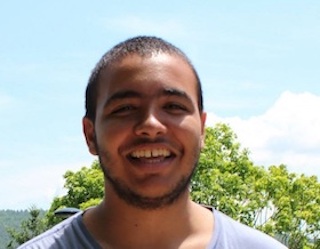Student Spotlight: Waleed Helweh

By Irena Garic
Where are you from, and where did you go to school as an undergraduate?
"Where are you from" is always one of the toughest questions I have to answer. My typical response is that I grew up for most of my life in Casablanca, Morocco. The slightly longer answer is that I was born in Qatar, moved to Egypt, Bahrain, and finally Morocco. My dad is Palestinian and my mom is Moroccan, and I would not be where I am, or the person I've become without their love and support. After finishing high school in Morocco, I decided to pursue a liberal arts education at Middlebury College in Vermont.
How did you become interested in your research?
I became interested in using ultrafast laser spectroscopy to study electronic processes in organic materials, such as covalent organic framework macrocycles and metal organic frameworks, when I started to understand the ability of physical chemistry and spectroscopy to help elucidate the microscopic behaviors of the different phenomena these materials undergo.
Tell us about your involvement in the graduate student organizations and let us know about any upcoming events?
I am fortunate to be a board member of Northwestern University Building on Diversity, or NUBonD, which is a graduate student organization focused on fostering an inclusive community within our department by valuing diversity of thoughts, perspectives, and backgrounds. I have found in this organization an incredibly supportive group of friends that all seek to enact positive change for everyone in the department. We will be hosting a Faces of Science seminar series at the end of July so be on the look-out for more details about that!
How would you explain what you study to non-scientists?
I use lasers to look at how light interacts with materials that can be used in different applications ranging from solar energy to electronics.
What are some potential applications for the work that you’re doing?
My work can help contribute to the basic understanding of complex materials used in optoelectronics and therefore allow for the development and implementation of improved design principles.
What is the best part about being in the Chen Group?
The small size of our group allows for a collegial atmosphere which leads to fun conversations and lots of support, so I am thankful for their help and friendship for these past two years.
What is your favorite pastime?
In my spare time, you can typically find me spending time with my friends whether we are exploring Chicago and its surroundings or playing games. I also love to cook and bake so I can share my creations with the people I care about.
